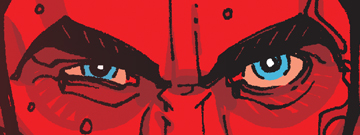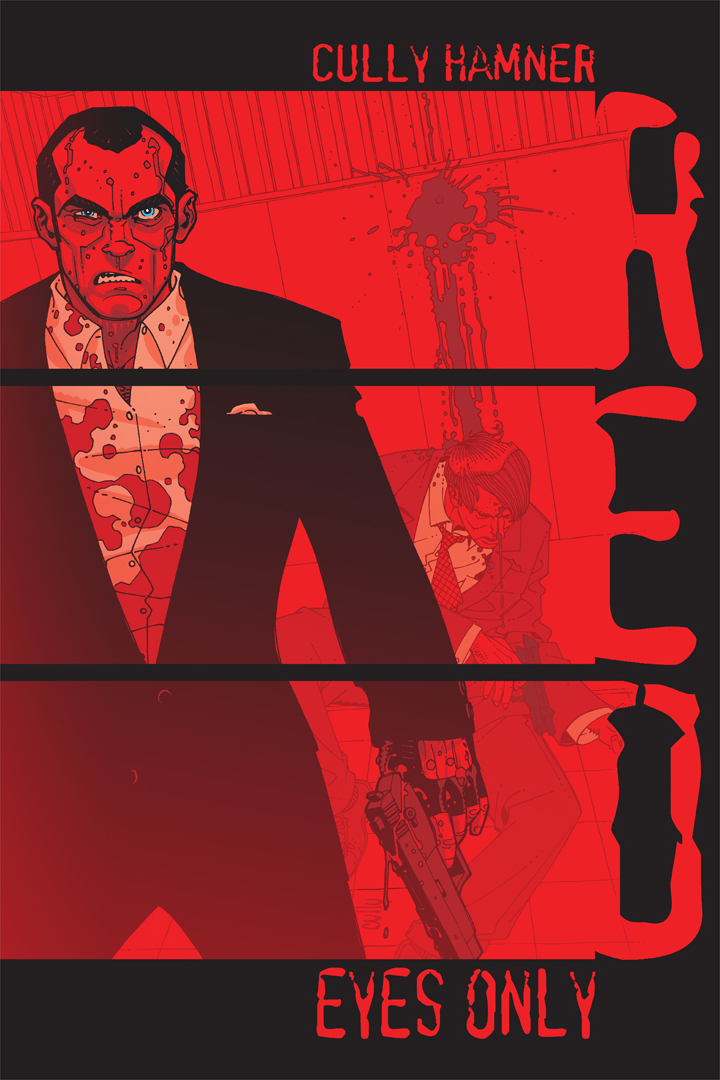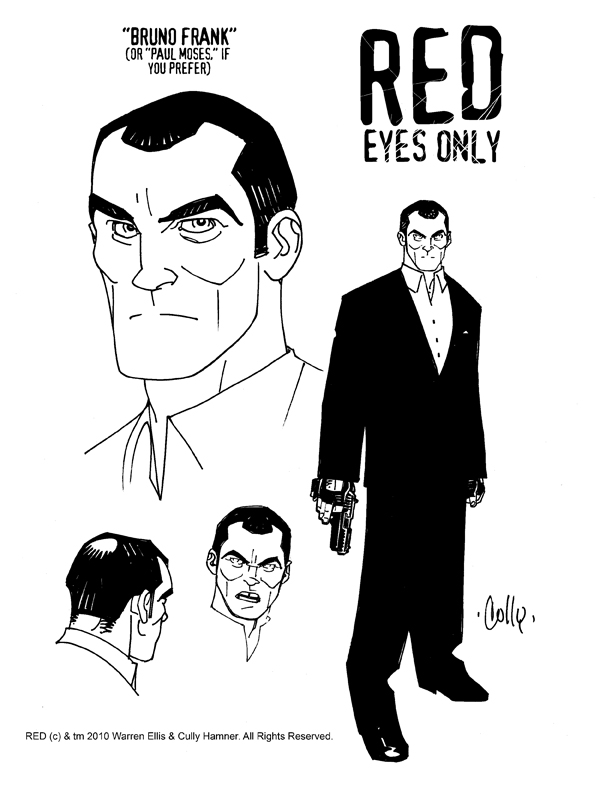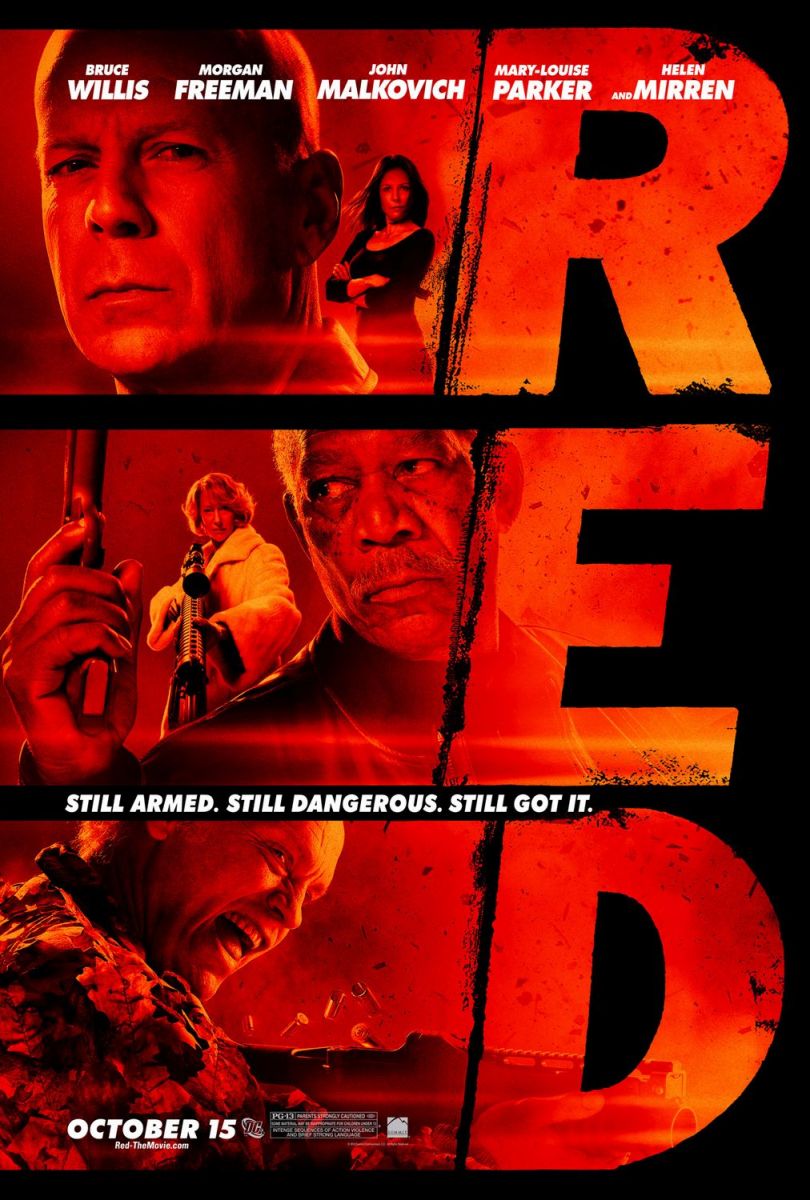 It's the story of a man whose past comes back to haunt him, leading him to return the favor. Cully Hamner, along with writer Warren Ellis, told the tale of Paul Moses in Red, a three-issue miniseries that hit comic stores in 2003, and will hit theaters as a major motion picture this October. I spoke with Cully about his role in the creation of Red, his work writing and drawing the new comic book prequel, and what he thinks of his work making the transition to film.
It's the story of a man whose past comes back to haunt him, leading him to return the favor. Cully Hamner, along with writer Warren Ellis, told the tale of Paul Moses in Red, a three-issue miniseries that hit comic stores in 2003, and will hit theaters as a major motion picture this October. I spoke with Cully about his role in the creation of Red, his work writing and drawing the new comic book prequel, and what he thinks of his work making the transition to film.
 Matt Adler: How did you first get involved with Red?
Matt Adler: How did you first get involved with Red?
Cully Hamner: Well, Warren and I had danced around the idea of working together for a little while at that point. We almost did a graphic novel for Dark Horse called MAGIC BULLETS, which, come to think of it, may or may not have been an early version of RED. You might have to ask Warren about that, but my memory of it is that it had a couple of bits in common with RED.
Anyway, we had traded e-mails here and there over a couple of years, and I was coming to the end of a Batman project and e-mailed Warren a pitch I had come up with on my own, just to see if he might want to do it with me. About two minutes later, and I mean really just a couple of minutes, I got a return e-mail from him that said “I was LITERALLY just about to send you this.” And it was the one-page pitch for RED. I think that within a week, we had it set up at Wildstorm.
MA: What was it like working with Warren? Did you have a hand in developing the story?
CH: I didn’t, no—the story was Warren’s. I like to think that I had a lot to do with shaping *how* we told that story. Warren wrote it specifically for me and with whatever strengths he thought I had in mind, for one thing. But also… you know, a lot of people think that once a script is written, the real decision-making process is over, and the artist is basically just drawing pictures from a list. That’s just not how it works, any more than an actor or director is just reading lines. There’s a lot that the artist is doing with regards to pacing, picking angles, designing environments and characters, and generally making the characters act… it’s way more involved than you might think. That’s one of the great things about working with someone like Warren—there’s the assumption that the artist brings a lot to the table, and he’s a writer that gives you the space to do that. And that’s rarer than you think.
 MA: What are you looking to explore with the forthcoming prequel, Red: Eyes Only?
MA: What are you looking to explore with the forthcoming prequel, Red: Eyes Only?
CH: What I wanted to get into in RED: EYES ONLY was specifically what it was that made Paul Moses retire in the first place, and to go further than that. I wanted to play with the idea that he didn’t get to retire the way he wanted and that the life he ended up retired to was completely empty. Warren had him hinting at some sadness at what he’d done and what could have been in the original book, in that scene where he goes to Sally’s apartment. There seemed to be a thread of regret that I could pull on and start to unravel.
MA: Is it a very different process, writing and drawing it yourself, rather than drawing from Warren's script?
CH: Uh, yeah! It’s a totally different thing. It’s like the difference between a builder working with an architect, and being both. If that door is in a weird place, you can blame the architect and change it. But if you’re ALSO the architect, it’s because you didn’t think things through well enough, and there’s only one person to blame. Your attention has to be at a much higher level. You get what I’m saying, right? It’s not a situation where I can troubleshoot what the writer gives me—you know, making what the writer has done flow a little better. It’s more of a ground-up process, and a certain amount of writing a comic is juggling what’s possible in the format. In comics, your main limitation is space. I have forty pages to play with here, so sometimes, my ambition has to be dulled by practicality, and it starts to become a math problem. So, within those limits, I still have to do something that engage the reader somehow, and make it meaningful as a piece of fiction.
All the respect in the world to writers, man. It’s hard. Every job in comics is hard in its own way—writing, drawing, coloring, lettering, editing. They all come with their own set of challenges. We’re all so used to just learning our particular disciplines in this medium, but it’s really worth your while to learn something about all the other people’s jobs. I’ve been drawing comics for close to twenty years, and visual and sequential storytelling is my main thing. It’s a language I’ve gotten pretty fluent in, I think. But having done a little writing here and there, as well as a fair amount of coloring covers and production work on a few books, is only a help. It makes you much more able to communicate with the people you’re working with, if nothing else, because you have an understanding of what they’re trying to do.
MA: Have you talked with Warren for any input?
CH: I sent him the outline, and he seemed to like it. He commented on a couple of things, and thought it had a good structure. He seemed totally cool with it. I don’t think he’s much into sequels or revisiting old work, to be honest, but I think he’s fine with me taking the opportunity to.
 MA: What's your take on Paul Moses as a character? What drives him? As a ruthless killer, does he have any kind of moral code?
MA: What's your take on Paul Moses as a character? What drives him? As a ruthless killer, does he have any kind of moral code?
CH: Honestly, I think he does, and you’ll see that in play in EYES ONLY. Here’s a guy who has done awful, unspeakable thinks in his life. So what is it that keeps him from being just a murderer? The answer is that he did it for his country, that he feels he’s getting dirty so that others can stay clean, and because he thought that if he made it to retirement, there would be absolution of some sort. There are things in his life that he’s sacrificed or abandoned, and getting out will allow him a second chance on his own terms—or so he thinks. But he’s made the classic deal with the devil.
MA: Is he wrestling with guilt over his actions?
CH: Absolutely, and not just with his actions as an assassin, but his choices as a son and a brother. It’s pivotal to why he decides to end his career.
MA: As those who have seen the preview trailers in theaters surely know by now, Red is making the jump to the big screen in October. Have you had any involvement with the film?
CH: Not really. I did visit the set, and I’m more involved with helping to promote it, but as far the actual production, they didn’t ask me, dammit! But no, they were all real nice and respectful of the book, and it was all good.
MA: What do you think of the casting?
CH: That’s like asking me what I think of back-rubs! Who doesn’t love a back-rub, and who wouldn’t like that cast? Willis is a prime example of an actor taking over my mental conception of a character. He isn’t what I originally saw in my head, but now I can’t see anyone else. And I’m in awe of the rest of the cast. Top to bottom, class and talent. And I also think that RED will be Robert Schwentke’s breakout American film as a director. He struck me as capable and smart.
 MA: How do you think the screenplay compares to the comic? Does it retain the themes of competence vs. bureaucracy, and being able to face your past, that the comic focused on?
MA: How do you think the screenplay compares to the comic? Does it retain the themes of competence vs. bureaucracy, and being able to face your past, that the comic focused on?
CH: You know, it is different, there’s no getting around it. The book we did had four characters and about the same number of locations. It would translate to maybe thirty minutes of screen time. We did a dark little story for very particular audience. They’re doing the same basic idea, and adding mass appeal. The Hoebers added a number of new characters and played with the tone of the piece, but if anything, they strengthened the themes. Warren likes to use the term, “the unexploded bombs of the Cold War,” and I think it’s a perfect way to describe the characters we meet in the book and in the movie.
MA: You're also doing covers for a series of one-shots which, unlike Eyes Only, are set in the movie continuity. I notice that 3 of the one-shots are being written by people who had a hand in the movie (the Hoeber brothers and DC exec Greg Noveck), but the fourth is being done by one of your colleagues from 12 Gauge Comics, Doug Wagner. Did you bring him in on this?
CH: I actually didn’t! Hank Kanalz and Ben Abernathy hired him on the strength of his writing on WORLD OF WARCRAFT: HORDE for them, and I only found out after the fact. But I’m totally happy they hired him, and having read his script, I think he was a great choice. Maybe now, more people will know what I already do about him—that he’s awesome.
MA: What else are you working on these days?
CH: Honestly, RED: EYES ONLY is all I can think about for the near future. Once that’s squared away, I know there are some things cooking at DC. Check back with me at New York Comic Con, and maybe I’ll have some news for you!
Matt Adler's done some things he isn't proud of too, but doubts a feature film of those exploits will be forthcoming.


I saw the preview for RED this weekend. It looks awesome. I’m going to try to hunt down the new book at NYCC. Thanks for the interview.
Just re-read this at my Barnes & Noble and it was so much fun. Cully has a sorta ‘Superman’ like quality to his pencils. Moses kinda looks like what he would do with Lex Luthor if he had a chance to draw a Sups comic.
Not sure if I want to read the movie tie-ins, but I can’t wait for the film. It’s gonna be soooo much fun.